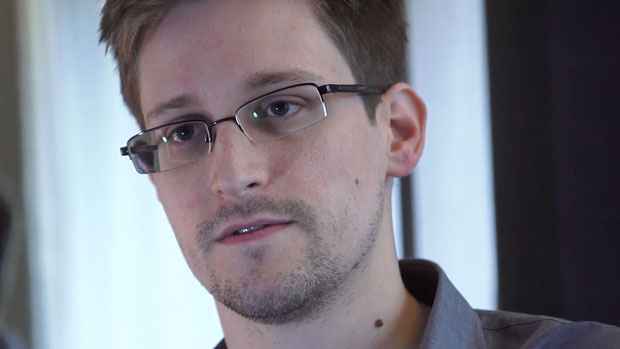Edward Snowden: 'I am famously paranoid'
In a rare interview, whistleblower says he assumed being taken seriously 'would be a challenge'

A free daily email with the biggest news stories of the day – and the best features from TheWeek.com
You are now subscribed
Your newsletter sign-up was successful
WHISTLEBLOWER Edward Snowden has revealed he is “famously paranoid” in one of the few interviews he has given since fleeing America.
The former NSA contractor has made his revelations about the US government's pervasive surveillance techniques via documentary-maker Laura Poitras and The Guardian’s Glenn Greenwald.
But in a rare interview, with investigative journalist Peter Maass, published in the New York Times today, Snowden admits he did not expect the journalists to take him seriously at first.
The Week
Escape your echo chamber. Get the facts behind the news, plus analysis from multiple perspectives.

Sign up for The Week's Free Newsletters
From our morning news briefing to a weekly Good News Newsletter, get the best of The Week delivered directly to your inbox.
From our morning news briefing to a weekly Good News Newsletter, get the best of The Week delivered directly to your inbox.
“I know journalists are busy and had assumed being taken seriously would be a challenge, especially given the paucity of detail I could initially offer,” he says.
In fact, Greenwald initially ignored Snowden's messages, finding the encryption software the whistleblower asked him to download “annoying and complicated”.
Snowden says he was surprised that there were people in news organisations who did not know that “any unencrypted message sent over the internet is being delivered to every intelligence service in the world”.
He turned instead to Poitras, who was working on a documentary about surveillance. She followed his instructions to create a secure system for them to communicate and within six months she and Greenwald were on a plane to Hong Kong to collect thousands of classified surveillance documents.
A free daily email with the biggest news stories of the day – and the best features from TheWeek.com
When they met, 30-year-old Snowden says he had the impression the journalists were “annoyed” that he was younger than they might have expected.
But he says as soon as they were behind closed doors both parties were reassured by an “obsessive attention to precaution and bona fides”. Snowden adds that he was “particularly impressed by Greenwald's ability to operate without sleep for days at a time”.
Asked when he realised he could trust Poitras, Snowden replies: “We came to a point in the verification and vetting process where I discovered Laura was more suspicious of me than I was of her, and I’m famously paranoid.”
This is underlined by the way Maass carried out his interview. Few journalists have access to Snowden, who has only recently secured temporary asylum in Russia. Maass had to hold an encrypted question-and-answer session with Snowden via Poitras.
Unusually for someone so paranoid, Snowden has been allowing Poitras to film him as part of her documentary, something he admits most spies would “allergically avoid”.
He explains: “The weight of the situation actually made it easier to focus on what was in the public interest rather than our own. I think we all knew there was no going back once she turned that camera on, and the ultimate outcome would be decided by the world.”
-
 El Paso airspace closure tied to FAA-Pentagon standoff
El Paso airspace closure tied to FAA-Pentagon standoffSpeed Read The closure in the Texas border city stemmed from disagreements between the Federal Aviation Administration and Pentagon officials over drone-related tests
-
 Political cartoons for February 12
Political cartoons for February 12Cartoons Thursday's political cartoons include a Pam Bondi performance, Ghislaine Maxwell on tour, and ICE detention facilities
-
 Arcadia: Tom Stoppard’s ‘masterpiece’ makes a ‘triumphant’ return
Arcadia: Tom Stoppard’s ‘masterpiece’ makes a ‘triumphant’ returnThe Week Recommends Carrie Cracknell’s revival at the Old Vic ‘grips like a thriller’
-
 Epstein files topple law CEO, roil UK government
Epstein files topple law CEO, roil UK governmentSpeed Read Peter Mandelson, Britain’s former ambassador to the US, is caught up in the scandal
-
 Iran and US prepare to meet after skirmishes
Iran and US prepare to meet after skirmishesSpeed Read The incident comes amid heightened tensions in the Middle East
-
 Israel retrieves final hostage’s body from Gaza
Israel retrieves final hostage’s body from GazaSpeed Read The 24-year-old police officer was killed during the initial Hamas attack
-
 China’s Xi targets top general in growing purge
China’s Xi targets top general in growing purgeSpeed Read Zhang Youxia is being investigated over ‘grave violations’ of the law
-
 Panama and Canada are negotiating over a crucial copper mine
Panama and Canada are negotiating over a crucial copper mineIn the Spotlight Panama is set to make a final decision on the mine this summer
-
 Why Greenland’s natural resources are nearly impossible to mine
Why Greenland’s natural resources are nearly impossible to mineThe Explainer The country’s natural landscape makes the task extremely difficult
-
 Iran cuts internet as protests escalate
Iran cuts internet as protests escalateSpeed Reada Government buildings across the country have been set on fire
-
 US nabs ‘shadow’ tanker claimed by Russia
US nabs ‘shadow’ tanker claimed by RussiaSpeed Read The ship was one of two vessels seized by the US military